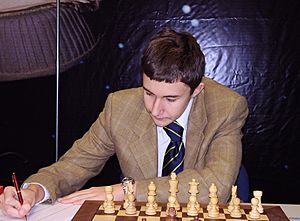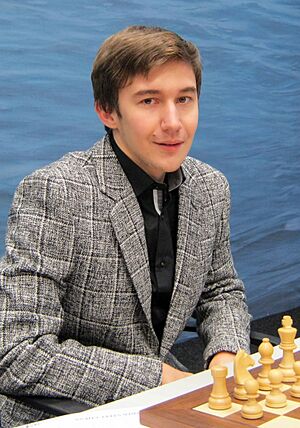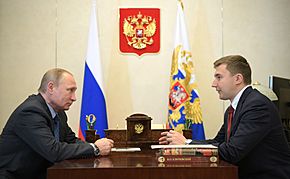Sergey Karjakin facts for kids
Quick facts for kids Sergey Karjakin |
|
|---|---|
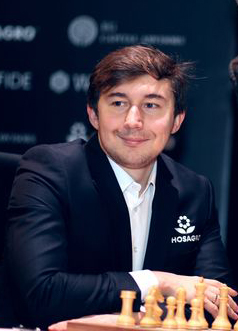
Karjakin in 2018
|
|
| Full name | Sergey Alexandrovich Karjakin |
| Country | Ukraine (until 2009, stripped of citizenship in 2025) Russia (since 2009) |
| Born | 12 January 1990 Simferopol, Crimean Oblast, Ukrainian SSR, Soviet Union |
| Title | Grandmaster (2003) |
| FIDE rating | 2752 (February 2026) |
| Peak rating | 2788 (July 2011) |
| Peak ranking | No. 4 (July 2011) |
| Member of the Federation Council for Crimea | |
| Assumed office 12 September 2024 |
|
| Personal details | |
| Political party | United Russia |
Sergey Alexandrovich Karjakin (born 12 January 1990) is a Russian chess Grandmaster and a politician. A chess prodigy, he was once the youngest Grandmaster in the world. He earned this title at just 12 years and 7 months old. In September 2024, he became a senator for Crimea in the Federation Council of Russia.
Karjakin won the European Under-10 Chess Championship in 1999. He also became the World Under-12 Chess Champion in 2001. He earned the International Master title at age 11. He officially became a Grandmaster in 2003. He played for Ukraine in the Chess Olympiad in 2004. There, he won gold medals for his team and for himself. He played in two more Chess Olympiads for Ukraine. In 2009, he won the Corus chess tournament. After this, he changed to represent Russia. He has played for Russia five times in the Chess Olympiad. He won an individual gold medal in 2010. He also helped Russia win team gold at the World Team Chess Championship in 2013 and 2019.
Karjakin won the 2012 World Rapid Chess Championship. He also won the Norway Chess tournament in 2013 and 2014. He competed in the Candidates Tournament 2014, finishing second. He won the Chess World Cup 2015. This win allowed him to play in the Candidates Tournament 2016. He won that tournament too. This meant he could challenge for the World Chess Championship. In November 2016, he played against Magnus Carlsen for the championship. He lost the match in quick tie-break games. The main games were a 6–6 draw. He won the 2016 World Blitz Chess Championship. He played in the Candidates tournament again in 2018, finishing third. He also qualified for the 2022 Candidates by coming second in the Chess World Cup 2021.
Karjakin's public support for the Russian invasion of Ukraine led to consequences. The Grand Chess Tour banned him from future events. He was also banned from playing FIDE-rated events for six months. This included the Candidates Tournament 2022. After his ban ended, Karjakin chose not to play in events. He refused to play if he could not use the Russian flag. Because FIDE also banned Russian flags, Karjakin has not been active. He dropped off FIDE's rating lists in June 2024.
Contents
- Becoming a Chess Star
- Chess Career Highlights
- 2006: Playing with the Best
- 2007: Top Performer
- 2008–2010: First Elite Win
- 2011: Rising in the Ranks
- 2012: World Rapid Champion
- 2013–2014: Winning Norway Chess
- 2015: World Cup Victory
- 2016: Candidates Winner and World Blitz Champion
- 2017–2018: Continued Strong Play
- 2019–2020: Team Success and Russian Championship
- 2021: World Cup Runner-Up
- 2022–Present: Suspension and Inactivity
- How He Plays Chess
- Personal Life
- Political Views
- Sanctions
- See also
Becoming a Chess Star
Sergey Karjakin started playing chess when he was five years old. He joined a chess club in Kramatorsk, Ukraine. His coach was Vladislav Borovikov. He became an International Master at 11 years and 11 months old.
Early Wins and Records
In 1999, he won the Under-10 European championship. In 2001, he became the Under-12 world champion. Also in 2001, Karjakin tied for first in the Under-14 European championship. He won the silver medal after a tie-break. In January 2002, he helped fellow Ukrainian Ruslan Ponomariov. Ponomariov was playing in the final of the FIDE World Championship. Karjakin was only 12 at the time.
Karjakin earned his Grandmaster title by doing well in tournaments. These included the Aeroflot Open in Moscow and events in Alushta and Sudak in 2002. He became the world's youngest Grandmaster at 12 years and 7 months. This record lasted for 19 years. In 2021, American player Abhimanyu Mishra became the youngest Grandmaster.
In 2003, Karjakin won a six-game match against Alexandra Kosteniuk. He also tied for second place in the Ukrainian Chess Championship.
Big Tournaments and Team Success
He played in the 2004 FIDE World Championship in Tripoli. He lost in the first round. Soon after, Karjakin played in the Dortmund Sparkassen Chess Meeting. There, he beat the world champion, Vladimir Kramnik, in a fast game. In October, Karjakin was the only person to beat a computer in a team championship in Bilbao, Spain. He was the youngest player there.
At the 36th Chess Olympiad in Calvià, he was the youngest player on the Ukrainian team. His team won the gold medal. He also won an individual gold medal. He scored 6½ out of 7 points. In December 2004, Karjakin finished second in a tournament in Pamplona. The next month, he won a group in the Corus Chess Tournament. This allowed him to play in the main group in 2006.
In April 2005, Karjakin entered the world's top 100 chess players. He was ranked 64th with a rating of 2635. He won the Young Stars of the World tournament in Kirishi, Russia, in May. In July, he tied for third place in the European Individual Chess Championship.
Chess Career Highlights
2006: Playing with the Best
In 2006, Karjakin played in the main Corus A tournament for the first time. He scored 7 out of 13 points. That same year, he played in the NH Chess Tournament in Amsterdam. This was a match between "Rising Stars" (young players) and "Experience" (older, skilled players). Karjakin's "Rising Stars" team won.
2007: Top Performer
Karjakin played in the NH Chess Tournament again in 2007. His "Rising Stars" team won again. He was the best player, scoring 7 out of 10 points. This earned him an invitation to the 2008 Amber chess tournament.
In October 2007, Karjakin finished second in the blindfold chess World Cup in Bilbao. In the Chess World Cup 2007, Karjakin reached the semi-finals. He lost to Alexei Shirov. In January 2008, just before his 18th birthday, Karjakin's rating went over 2700 for the first time. This is a mark for "elite" players. His rating was 2732, and he was ranked 13th in the world.
2008–2010: First Elite Win
In July 2008, Karjakin won a fast chess match against Grandmaster Nigel Short. In February 2009, he won his first major tournament. This was the A group of the Corus chess tournament in Wijk aan Zee. He scored 8 out of 13 points.
He won the ACP World Rapid Cup in May 2010. He beat Dmitry Jakovenko in the final.
2011: Rising in the Ranks
In June 2011, Karjakin took second place in the Bazna Kings Tournament in Mediaș, Romania. He was tied for the lead with Magnus Carlsen in the final round. Karjakin's strong play helped him move up in the world rankings. He passed Kramnik to reach fourth place.
In November, Karjakin shared third place in the Tal Memorial in Moscow.
2012: World Rapid Champion
In July 2012, Karjakin won the World Rapid Chess Championship. He was a full point ahead of Magnus Carlsen in Astana, Kazakhstan. In the same month, he tied for first at Dortmund. He finished second after a tie-break. In November–December 2012, Karjakin shared first place in a FIDE Grand Prix event in Tashkent, Uzbekistan.
2013–2014: Winning Norway Chess
In May 2013, he won the first Norway Chess tournament. He scored 6½ out of 9 points. He was half a point ahead of Carlsen.
In March 2014, he finished second in the FIDE Candidates Tournament. This event was held in Khanty-Mansiysk, Russia. He finished behind Viswanathan Anand.
In June 2014, Karjakin won the Norway Chess tournament for the second year in a row. He played against nine other top players. Six of them were in the FIDE top 10.
2015: World Cup Victory
Karjakin won the Chess World Cup 2015. He came back from being down 0–2 against Peter Svidler. He eventually won 6–4 in quick tie-break games. By finishing in the top two, Karjakin qualified for the 2016 Candidates Tournament.
He also took part in the Russia–China Challenge Match. Karjakin helped team Russia win.
2016: Candidates Winner and World Blitz Champion
In March 2016, Karjakin won the 2016 Candidates Tournament in Moscow. This meant he would play against Magnus Carlsen for the World Chess Champion title. He beat Fabiano Caruana in the last round. He finished with 8½ out of 14 points.
The World Chess Championship 2016 took place in November 2016 in New York City. The match had 12 main games. If tied, they would play faster tie-break games. Karjakin won the eighth game but lost the tenth. The match was tied 6–6. Carlsen then beat Karjakin 3–1 in the rapid tie-breaks. Carlsen won the championship.
Karjakin won the 2016 World Blitz Chess Championship. This happened in December 2016. He and Carlsen both finished with 16½ out of 21 points. Karjakin won on a tie-break rule. He was crowned the 2016 World Blitz Champion.
2017–2018: Continued Strong Play
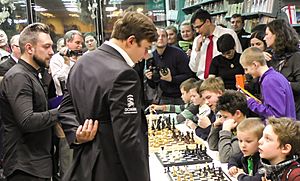
In December 2017, he played in the London Chess Classic. He finished eighth.
In January 2018, Karjakin competed in the Tata Steel Masters. He placed seventh.
In March 2018, he played in the Candidates Tournament 2018. He finished third.
In April, he took part in the fifth edition of Shamkir Chess. He finished third.
From May to June, he competed in the sixth edition of Norway Chess. He finished last in this event.
2019–2020: Team Success and Russian Championship
In March 2019, Karjakin played for the Russian team at the World Team Championship. The Russian team won first place.
From March to April, he competed in Shamkir Chess 2019. He tied for second place.
From December 2020, Karjakin competed in the 73rd Russian Chess Championship. He finished second behind Ian Nepomniachtchi.
2021: World Cup Runner-Up
In July–August 2021, Karjakin played in the Chess World Cup 2021. He beat several strong players to reach the semifinals. He then beat Vladimir Fedoseev to qualify for the Candidates Tournament 2022. Karjakin lost to Jan-Krzysztof Duda in the finals. He finished second in the tournament.
Karjakin also played in the 2021 FIDE World Rapid Championship. He finished in 11th place.
2022–Present: Suspension and Inactivity
In January 2022, he competed in the Tata Steel Chess Tournament 2022. He finished tied for fifth place.
Suspension from Chess
In February 2022, Karjakin publicly supported the Russian invasion of Ukraine. This led to FIDE, the world chess organization, looking into his actions. The Grand Chess Tour banned him from their events. They said his comments were "hostile." Chess.com also banned him from prize tournaments.
In March 2022, FIDE's Ethics and Disciplinary Commission banned him from playing any FIDE-rated events for six months. This meant Karjakin could not play in the Candidates Tournament 2022. Karjakin said he was a patriot first and a chess player second. He did not regret his statements. Russian President Vladimir Putin gave him a medal in June 2022.
After his ban ended in September 2022, Karjakin chose not to play. He refused to participate in tournaments where he could not play under the Russian flag. He did not play in the 2023 Chess World Cup. He said he could not represent his country or hear its national anthem.
Since January 2022, Karjakin has played very few official chess games.
How He Plays Chess
Karjakin is known for his strong defensive skills. People sometimes call him Russia's "Minister of Defense." He is good at defending difficult positions. He showed this against World Champion Magnus Carlsen in the World Chess Championship 2016. Karjakin is okay with playing for a small disadvantage if it is his best option. But he can also play very aggressively when needed.
Personal Life
Sergey Karjakin is of ethnic Russian background. In July 2009, he became a Russian citizen. Later that year, he changed from the Ukrainian to the Russian chess federation. He has lived in Moscow since 2009.
In 2013, he finished college. He studied social pedagogy.
Karjakin is an Eastern Orthodox Christian. He married Galiya Kamalova in May 2014. She was the secretary of the Moscow chess federation. They have two sons, born in 2015 and 2017. He was previously married to Ukrainian chess player Kateryna Dolzhykova.
In January 2024, Karjakin was in a serious car accident. He was a passenger in a car that flipped over. He broke some ribs but his injuries were not life-threatening.
Political Views
Karjakin is known for strongly supporting Vladimir Putin. In 2022, he publicly supported the Russian invasion of Ukraine.
Sanctions
In 2022, Ukraine placed sanctions on Karjakin. This was because of his public support for the Russian invasion of Ukraine.
Karjakin was stripped of his Ukrainian state awards in January 2025. This was by a decision from Ukrainian President Volodymyr Zelenskyy.
See also
 In Spanish: Serguéi Kariakin (ajedrecista) para niños
In Spanish: Serguéi Kariakin (ajedrecista) para niños
 | Aurelia Browder |
 | Nannie Helen Burroughs |
 | Michelle Alexander |


